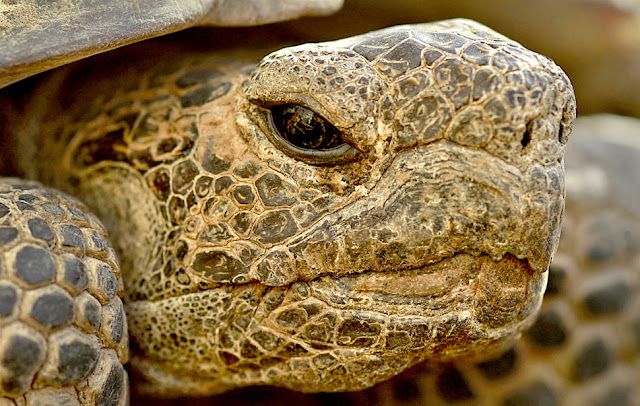The Biggest Animals Kingdom and in The World | Desert Tortoise | These turtles reach length of 10-14 inches (25-36 cm), the males are slightly larger than women. The adult males are especially long horns, like the women, the plastron (bottom) of the concave than the female turtles. Males are larger tails than females. The high-domed shell, and greenish-tan to dark brown. Desert tortoises can grow up to 4-6 "(10-15 cm) tall and weighs 15.8 pounds (4.7 kg) when fully grown.'S Sharp front claws, as of the balance sheet and the digging. Feedback legs are thin and long. turtles can live where the soil temperature does not exceed 140 degrees Fahrenheit (60 degrees Celsius) to be able to dig underground caverns and escape the heat. Scientists have divided the desert tortoise into two types: the Agassiz and Morafka desert tortoises, a possible third type in the northern and southern Sonora, Sinaloa, Mexico. An isolated population of the desert tortoise Agassiz made the Black Mountains in the north-western Arizona. They live in different types of habitats, rocky reef sand foot. Turtles show very strong site fidelity, and well-established home ranges where they know that their sources of food, water and minerals, and the neighbors.
The desert tortoise is a herbivore. Adult turtles can survive a year or more do not have access to water. One of the defense mechanisms of the turtle, if the guide is to empty the bladder. Turtles mate in spring and autumn. Female desert tortoises grow two white glands around the jaw, chin gland is called, which means mating season. The prisoner Sonoran desert tortoise is male glands Chin eating strawberries. Wild female turtles may have two or even three clutches a year. The turtles reach sexual maturity in 15 years. Edwards et al. reported that 35% of the Phoenix area, desert tortoises Gopherus agassizii and hybrids between morafkai G., G. and morafkai or Texas Turtle, G. Berlandieri. The intentional or unintentional release of these turtles have disastrous consequences for wild turtles. Desert tortoises can not move or caught in the wild state borders.
Desert tortoises must be in the open air, a large area of land and access to water and vegetation. An underground den and a balanced diet is essential for health turtles in captivity. More information can be found here breeding of desert tortoises Consequences for research, educational campaigns is essential to prevent contact with turtles in captivity of wild populations, as the study Johnson et al. (2006). Education campaigns through veterinarians, government agencies, schools, museums and community centers across the range of the desert tortoise may be useful to limit the spread of disease to wild populations of turtles.
Strategies include encouraging people not to raise turtles in captivity, the different types of turtles is not in the center (to help prevent the spread of new diseases in the population of the desert tortoise), in order to ensure turtles in captivity is believed to prevent the escape to nature and ensure that turtles in captivity released into the wild. In summary, the desert tortoises are severely affected by the disease.
Find The Biggest Animals Kingdom and in The World














0 comments
Posting Komentar